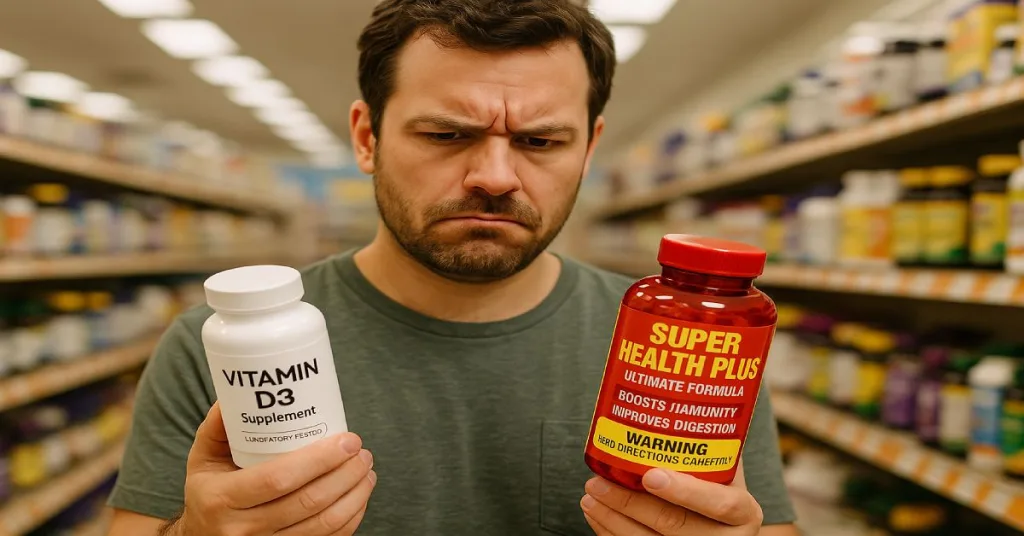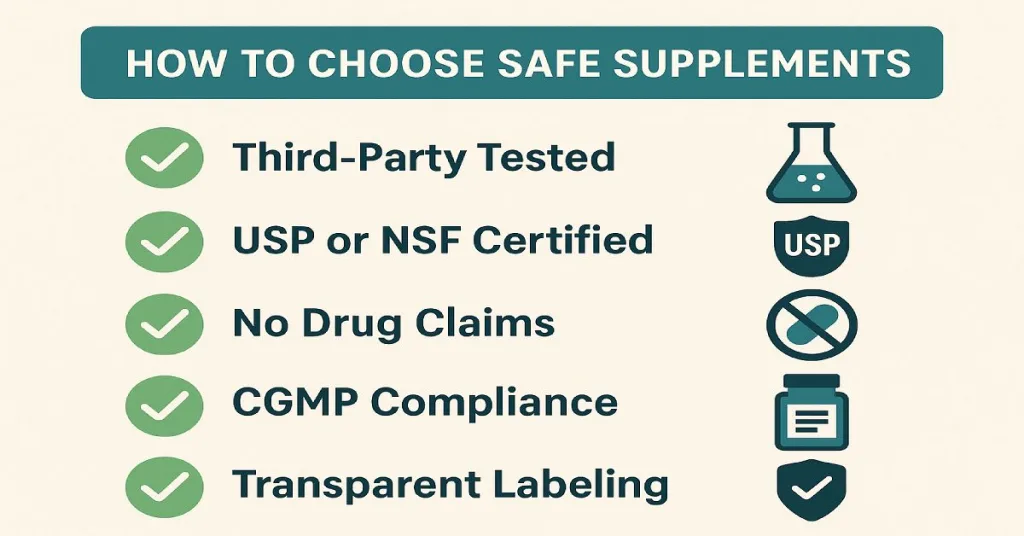The FDA’s latest crackdown on supplement claims is changing the rules for everyone—consumers, supplement makers, and shady brands alike.
The supplement industry just got a major wake-up call. The FDA is cracking down harder than ever before on misleading supplement claims, dangerous ingredients, and sloppy manufacturing—and it’s not just about one product or one shady company. From kratom-derived opioids to bogus zero-calorie promises and botched manufacturing practices, the message is clear: the Wild West days of supplements are coming to an end.
If you take supplements—or sell them—this affects you. Here’s everything you need to know about what’s happening, why it matters, and how to protect yourself.
The Kratom Crisis: 7‑OH and the FDA’s New Line in the Sand
In July 2025, the FDA sent warning letters to seven companies for selling products containing 7-hydroxymitragynine (7‑OH), a synthetic derivative of the plant kratom. These were being sold as gummies, drink mixes, tablets, and vapes—mostly in gas stations, head shops, and online storefronts.
Why the panic? 7‑OH is not just unapproved. It’s dangerous. It binds to opioid receptors in the brain and has been shown to be up to 13 times more potent than morphine. It’s addictive. It’s toxic. And it’s been packaged to look like candy.
By the end of the month, the FDA formally recommended that 7‑OH be classified as a Schedule I controlled substance—on par with heroin and LSD. Florida issued an emergency rule banning it, and more states are now drafting similar laws.
If you’re taking kratom or kratom-based supplements, now is the time to check your labels. Some products are still legal, but 7‑OH is not—and if it’s in your stack, you may be gambling with your health.
Mislabeling Madness: The Hydro BCAA Lawsuit
While the kratom crackdown made headlines, the legal system took aim at a different issue: false labeling.
In June 2025, a federal appeals court revived a lawsuit against ProSupps USA, the makers of Hydro BCAA. The product label claimed “zero carbs, zero calories.” Lab testing revealed that was false. It did contain carbs and calories. Not a lot—but enough to matter.
What makes this case important is the court’s ruling. The judges said that even a single test showing mislabeling is enough to bring a lawsuit under California law.
That’s a big deal. Up until now, many supplement makers assumed they were safe from legal trouble unless a dozen tests proved something wrong. Not anymore. This opens the door for more class-action suits based on even small misrepresentations.
The lesson? Don’t trust the label blindly. Even the big-name brands get it wrong—or worse, deliberately mislead.

CGMP Violations: What Happens When You Skip the Basics
In another part of the crackdown, the FDA sent a warning letter to Anti L’Age, a supplement brand that was found violating Current Good Manufacturing Practices (CGMPs).
Their infractions were serious:
- No ingredient testing to verify identity or potency
- No written specifications for ingredients or final products
- Incorrect serving size info
- No process to handle adverse event reports
- No way for consumers to contact them about side effects
In short, they were making supplements without any of the quality control systems required by law. That’s not just sloppy—that’s dangerous.
If a product is made without proper controls, you have no idea what’s really in the bottle. You could be taking more—or less—of the active ingredient than listed. You could be exposed to contaminants. Or you could be taking something entirely different.
This case is a reminder that fancy packaging and bold claims mean nothing if what’s inside the capsule hasn’t been verified.
DSHEA, Claims, and Why the Rules Are Finally Being Enforced
To understand what’s changing, you need to understand DSHEA—the Dietary Supplement Health and Education Act of 1994. This law basically said supplements are not drugs, so they don’t need FDA approval before being sold. Companies are responsible for ensuring their own products are safe and truthfully labeled.
Under DSHEA, companies can make “structure/function” claims like “supports brain health” or “promotes immune function.” But they cannot say “treats anxiety” or “cures depression.” Those are drug claims, and they’re illegal without FDA approval.
For years, the FDA has lacked the resources to police all the nonsense being sold as supplements. But now, that’s changing.
Between the crackdown on 7‑OH, the legal win on mislabeling, and warning letters about CGMPs, the agency is making it clear: you can’t get away with sloppy science or empty promises anymore.
Why This Matters to You
This crackdown isn’t just about shady companies. It’s about your health, your wallet, and your trust.
If you’re a consumer, here’s what you need to understand:
- Not all “natural” supplements are safe. 7‑OH is derived from a plant, but it’s been concentrated and synthesized into something far more dangerous than what occurs in nature.
- Labels lie. Just because it says “zero carbs” or “clinically tested” doesn’t make it true.
- The FDA is waking up—but you still need to be your own watchdog.
If you’re a seller, the pressure is on. If your labels aren’t accurate, your products aren’t tested, or your claims push into drug territory, you’re at risk—legally and financially.
How to Protect Yourself as a Supplement Consumer
The best thing you can do is be proactive. Here’s how to stay safe and smart when buying supplements:
- Buy from reputable brands
Stick to companies that offer third-party lab testing and follow CGMPs. Look for certifications from USP, NSF, or Informed Choice. - Read the label critically
Watch for red flags like “cures,” “treats,” or “reverses.” Those are illegal drug claims. If a company is making them, it’s either ignorant or dishonest. - Verify third-party testing
Don’t just look for the words “lab tested.” Real third-party testing should include a certification badge or a link to batch reports. If it’s not available, assume it doesn’t exist. - Watch for candy-style marketing
Supplements shouldn’t look like sour gummies or lollipops, especially if they claim to help with pain, anxiety, or sleep. These are the kinds of products being targeted in the 7‑OH crackdown. - Report any issues
If you have a bad reaction to a supplement or find something suspicious on the label, report it to the FDA via the MedWatch program. It helps others stay safe—and it might trigger a warning letter or recall.

The Future of Supplement Regulation
What we’re seeing right now is likely just the beginning.
- 7‑OH will probably be banned nationwide by the end of the year.
- More states will start restricting sketchy ingredients.
- The supplement industry will face more lawsuits over false labels and health claims.
- CGMP enforcement will ramp up as more inspections happen.
For consumers, this is good news—if you stay informed. For companies cutting corners, the days of easy money are ending fast.
Final Thoughts
The FDA’s latest crackdown isn’t just about one substance or one label. It’s a full-court press on the worst abuses in the supplement industry.
And it’s long overdue.
For years, supplement companies have been able to operate in a grey zone—hiding behind vague claims, untested ingredients, and unverified labels. But as more people take supplements daily, the stakes have gotten too high.
Now, the FDA is finally stepping in. And if you care about your health—or your customers’—you better be paying attention.
see also: How to Start Taking Supplements: A Beginner’s Blueprint